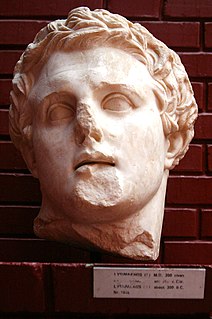 W
WSomatophylakes were the bodyguards of high-ranking people in ancient Greece.
 W
WBalakros, also Balacrus, the son of Nicanor, one of Alexander the Great's "Somatophylakes" (bodyguards), was appointed satrap of Cilicia after the Battle of Issus, 333 BC. He succeeded to the last Achaemenid satrap of Cilicia, Arsames.
 W
WHephaestion, son of Amyntor, was an ancient Macedonian nobleman and a general in the army of Alexander the Great. He was "by far the dearest of all the king's friends; he had been brought up with Alexander and shared all his secrets." This relationship lasted throughout their lives, and was compared, by others as well as themselves, to that of Achilles and Patroclus.
 W
WLysimachus was a Thessalian officer and diadochus of Alexander the Great, who became a basileus ("King") in 306 BC, ruling Thrace, Asia Minor and Macedon.
 W
WMenes of Pella, son of Dionysius, was one of the officers of Alexander the Great; and after the Battle of Issus was admitted by the king into the number of his somatophylakes, in the place of Balacrus, who was promoted to the satrapy of Cilicia.
 W
WPausanias of Orestis was a member of Philip II of Macedon's personal bodyguard (somatophylakes). He assassinated Philip in 336 BC, possibly at the behest of Philip's wife Olympias, or even his son Alexander the Great. Pausanias was killed while fleeing the assassination.
 W
WPeucestas was a native of the town of Mieza, in Macedonia, and a distinguished officer in the service of Alexander the Great. His name is first mentioned as one of those appointed to command a trireme on the Hydaspes. Previous to this we do not find him holding any command of importance; but it is evident that he must have distinguished himself for his personal valour and prowess, as he was the person selected by Alexander to carry before him in battle the sacred shield, which he had taken down from the temple of Athena at Troy. In this capacity he was in close attendance upon the king's person in the assault on the capital city of the Malavas ; and all authors agreed in attributing the chief share in saving the life of Alexander upon that occasion to Peucestas, while they differed as to almost all the other circumstances and persons concerned.
 W
WPtolemy I Soter was a Greek general, historian and companion of Alexander the Great of the Kingdom of Macedon in northern Greece who became ruler of Egypt, part of Alexander's former empire. Ptolemy was pharaoh of Ptolemaic Egypt from 305/304 BC to his death. He was the founder of the Ptolemaic dynasty which ruled Egypt until the death of Cleopatra in 30 BC, turning the country into a Hellenistic kingdom and Alexandria into a center of Greek culture.